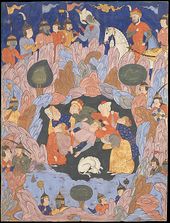Template:Pictorial-Islam-options: Difference between revisions
| [checked revision] | [checked revision] |
mNo edit summary |
mNo edit summary |
||
| Line 188: | Line 188: | ||
<option weight="1">{{Pictorial-Islam|1=Flat Earth and the Qur'an|2=[[File:Muslim Researcher on Astronomy Fadhel Al-Sa'd.JPG|280px|link=Flat Earth and the | <option weight="1">{{Pictorial-Islam|1=Flat Earth and the Qur'an|2=[[File:Muslim Researcher on Astronomy Fadhel Al-Sa'd.JPG|280px|link=Flat Earth and the Quran]]|3=As recently as 1993 the supreme religious authority of Saudi Arabia Sheik Abdul-Aziz Ibn Baaz declared "The earth is flat. Whoever claims it is round is an atheist deserving of punishment." In a televised debate aired on Iraqi Al-Fayhaa TV (October 31, 2007), Muslim Researcher on Astronomy Fadhel Al-Sa'd also declared that the Earth is flat as evidenced by Qur'anic verses and that the sun is much smaller than the Earth and revolves around it. As devout Muslims, they have good reason to conclude the Earth is flat; the Qur'anic verses 15:19, 20:53, 43:10, 50:7, 51:48, 71:19, 78:6, 79:30, 88:20 and 91:6 all clearly state this. While many have attempted to explain away this oddity, they prey on their listeners ignorance of the Arabic language. As such, their apologetic claims have been easily refuted by native Arabic speakers. There is no escaping the fact that, according to the Qur'an, the earth is flat. ([[Flat Earth and the Quran|''read more'']])}}</option> | ||
Revision as of 11:29, 25 January 2014
Also see: Template:Pictorial-Islam
|
